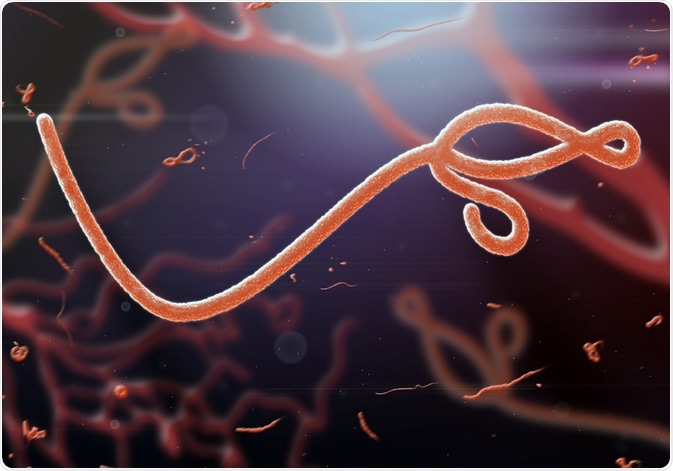Since it is not always possible to identify patients with Ebola hemorrhagic fever early in the course of disease (primarily due to non-specific symptoms), it is vital to apply standard precaution measures on a consistent basis. These include proper hand hygiene, use of gloves before contact with any bodily fluids, as well as using a gown and adequate eye protection. Safe handling and disposal of instruments and disinfection of the environment is also a high priority.
Suspected or confirmed Ebola patients should be isolated in single rooms, or at least in specific confined areas. All contacts need to be identified and their body temperature monitored daily for 21 days after exposure. The eventual development of a fever also requires isolation and testing. Social mobilization and suitable health education efforts are critical for tracking contacts and successful case identification.
 Microscopic view of the ebola virus. Image Credit: jaddingt / Shutterstock.com
Microscopic view of the ebola virus. Image Credit: jaddingt / Shutterstock.com
Key preventive interventions
When traveling or staying in an area affected by Ebola outbreak, it is important to adhere to three key preventive interventions in order to minimize the risk of infection. A single lapse in proper infection control can set in motion another chain of transmission and worsen the outbreak.
First, meticulous infection control should be implemented wherever possible. The greatest risk of viral transmission does not arise from diagnosed patients, but from the delayed detection and isolation of the infected individuals. Since the early symptoms of the disease are non-specific, family members, healthcare workers and others can be exposed to the virus before the infection is diagnosed.
Second, meat from hunted wild animals should be avoided (so-called “bush meat”). In places where consumption of such meat continues, it is necessary to encourage safer slaughter and handling procedures. Also, contact with bats should be averted, since they may be the primary reservoir of the virus. Deforestation and other changes in the environment create new opportunities for contact of humans with bats; hence special care is needed in addressing this problem.
Third, there is a dire need for modification of the traditional funeral practices, which often represent sources of infection due to the contact with bodily fluids of the deceased individuals. As this is a culturally sensitive matter, appropriate outreach, education and support are crucial.
What we know (and don't know) about Ebola - Alex Gendler
Vaccine development
At the moment there are no approved vaccines for Ebola hemorrhagic fever. An effective vaccine would be extremely valuable – not only for at-risk healthcare workers, first responders, military and researchers, but also for planned vaccination in the affected populations (especially during outbreaks).
Thus far, DNA and subunit vaccines, as well as several viral vector approaches (both replicating and non-replicating) have been tested as potential candidates. Their effectiveness in inducing protective immunity has been evaluated in nonhuman primate models for Ebola virus infections, because disease progression resembles human cases.
Although these vaccine platforms use different mechanisms to confer protection, several of them are able to tackle lethal disease in nonhuman primates, vouching that vaccination against Ebola virus is not unfeasible. Still, live attenuated recombinant Ebola virus vaccine vectors have several safety issues, despite having a clean record in test animals (including immune-deficient animals).
Vaccine candidates should demonstrate efficacy in at least two animal models if they are to be considered – including non-human primates (currently the gold standard animal model). Merely a few vaccine platforms have passed such stringent requirements, which are now considered for clinical trials on people. These promising vaccine candidates are based on recombination technologies that use either attenuated replication-competent or generated replication-deficient systems.
As of September 2014, human testing of an investigational vaccine to prevent Ebola is currently conducted by the American National Institute of Allergy and Infectious Diseases (NIAID), part of the American National Institutes of Health (NIH). Trials are carried out in healthy adults who are not infected with Ebola virus, so it can be determined whether the vaccine is safe and whether it induces a sufficient immune response.
References
Last Updated: Jan 29, 2021